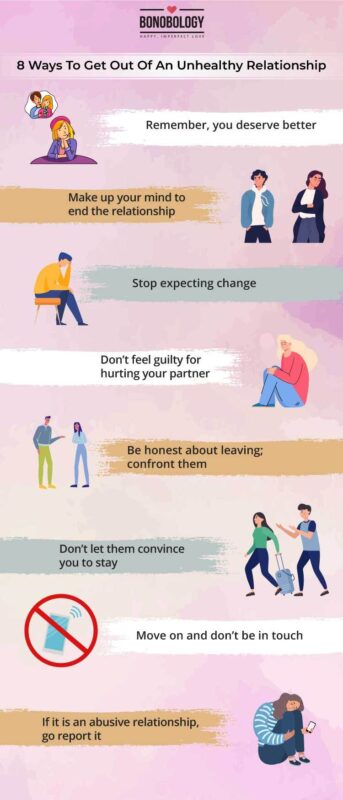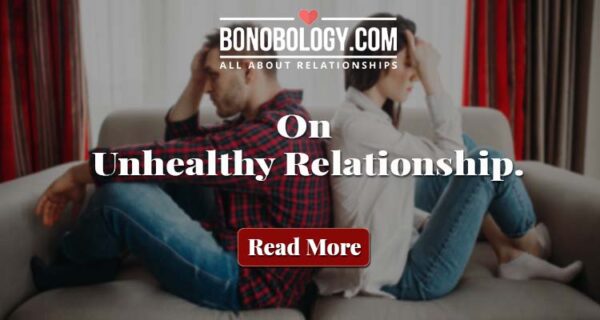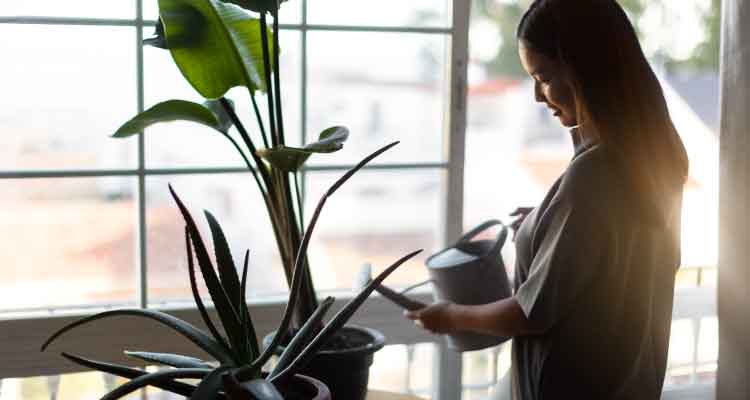An overwhelming need to avoid confrontation often makes people tolerate infidelity, abuse, and a lack of trust and contentment. If you are trying to figure out how to get out of an unhealthy relationship, the first step is to identify the issues you are facing. Leaving a bad relationship is not easy, we agree. It’s especially hard if you love your partner. However, it’s not impossible either. To be able to do that, you have to first identify the warning signs and acknowledge them for what they are. It’s hard to fix such an equation, and often, your best bet is to walk away and focus on healing the emotional trauma caused by unhealthy patterns in a relationship. We spoke to relationship and intimacy coach Shivanya Yogmayaa (internationally certified in the therapeutic modalities of EFT, NLP, CBT, and REBT), who specializes in different forms of couples counseling, about the signs of an unhealthy romantic relationship and how to get out of one.
Characteristics Of An Unhealthy Relationship
Can women get out of unhealthy relationships? Or can a man leave a harmful relationship? If you want out, you first need to know and acknowledge that you are in a bad relationship. Sometimes, people don’t understand the severity of the relationship problems they’re dealing with. Unless they do that, it’s impossible to ascertain when to leave a relationship and when to stay on and fight for your future as a couple. As a result, they keep grappling with the same issues with no healthy resolution in sight. Conflict between a couple is inevitable. In fact, it is normal and healthy, provided it’s not rooted in toxicity. Which begs the question: how do you differentiate between healthy and toxic conflict? The answer to this question can also help you differentiate a healthy relationship from an unhealthy one. Here are some characteristics of the latter to help you decide:
The relationship feels tiring; you don’t want to talk to your partnerYou don’t find it worth sharing with your partner all the little and big things in your lifeYour relationship is toxic if it is filled with control and possessivenessYou are in a relationship that makes you feel cagedYou are in an abusive relationship. Your partner is short-tempered and you fear them or vice versaThere is a void even when you are together and there is a lot of insecurityYou always complain about your relationshipYou demotivate and demean each otherMutual respect does not exist anymoreThere is cheating in the relationship
Shivanya says, “One of the most prominent and severe or serious characteristics of unhealthy relationships is mental, verbal, physical, or emotional abuse. There’s also substance abuse. Repeated lies, broken promises, narcissism, lack of respect, and hiding things are also a few red flags to watch out for, which of course, have a drastic effect on a person’s mental health. “Such repetitive behavior patterns create distrust and resentment between partners. It eventually causes conflict, arguments, and abuse, making it difficult for partners to co-exist in the relationship. One or both partners start thinking about how to get out of an unhealthy relationship at this point, which might take a toll on their emotional health.” If you can relate to the above-mentioned signs, then understand that staying in the relationship may not be in your best interest. No good can ever come out of a connection that harms your well-being. However, we still find ourselves staying in bad relationships like our lives depended on them. Why do people stay in clearly abusive relationships? Let’s find out.
Why Is It Hard To End A Bad Relationship?
Based on the characteristics mentioned above, it’s clear to see that no one should willingly stay in a bad relationship. Still, however, people find themselves clinging on to not-so-healthy relationships, unable to let go of them. A survey of 2,031 British adults found that 60% of them stay in bad relationships, and the reasons for this can vary from a lack of self-confidence to laziness and fear of the unknown. Eventually, these relationships pose a risk of taking a toll on a person’s mental health. Let’s take a look at a few other reasons why people end up staying in bad relationships:
1. They’ve “invested” too much time in it
You’ve probably heard that one before, haven’t you? “We’ve invested so much time into the relationship, we can’t just end it now,” is like saying “I’ve invested so much time in physically beating myself with a bat, I can’t just end it now!” Doesn’t sound too smart, does it? It’s one of the most common reasons people fail to end bad relationships.
2. The alternatives seem worse
Leaving a bad relationship means that a person will have to cope with the breakup and restart the process of finding a partner, which doesn’t seem a desirable choice. Though people can see that they’re in undesirable dynamics, leaving it and wading off into unknown waters might still seem too scary a task to take on.
3. Clinging on to hope
“Maybe, one day, my partner will change” is a common thing people in negative relationships say to themselves to convince themselves to stay. As a result, they never figure out when to leave a relationship, and end up harming their mental health. The truth is, they’re hoping for a day that’s never going to come, and they’re going to get caught up in a vicious cycle of hope and disappointment.
4. Low self-esteem
Those who struggle with low self-esteem might believe that they deserve a toxic relationship. This thinking is rooted in mental health issues stemming from past emotional traumas, especially the ones that can be traced back to one’s childhood. Being tolerant of toxic behavior and assuming that they’re never going to find a partner if they break up with their current one are classic signs of low self-esteem in a relationship. It’s understood that when you’re in a bad relationship, it is best to leave for the sake of your peace and sanity. Now that you know what constitutes a toxic relationship and why people struggle to end such a dynamic, let’s take a look at exactly what you need to do to end it, lest you keep accepting unhealthy treatment and/or physical or emotional abuse in the name of love.
8 Ways To Get Out Of An Unhealthy Relationship
Are there ways to end an unhealthy relationship? Is it possible to deal with an unhealthy romantic relationship? Yes, there are ways to leave a toxic relationship. A destructive equation with your partner damages your soul. It alters your faith in love. You are forced to believe that love does no good and all relationships are toxic and troublesome. According to Shivanya, “You need to be aware that you are in an unsafe relationship and reach out for help if you are being abused or under threat.” If you are looking for answers or solutions to your “Can a woman get out of an unhealthy relationship?” or “I need advice on how to get out of a relationship that has damaged my emotional health” dilemmas, look no further. Here are 8 tips that may help you sketch a plan to get out of the toxic relationship you are in:
1. Start by reminding yourself that you deserve better
We know it’s hard to get out of a bad relationship when you love your partner so much. However, no matter what you feel toward your partner – it can be love, sympathy, or empathy – you have to understand that you are equally important. You deserve better and a relationship is meant to make you feel safe, liberated, and happy. It is supposed to give you peace and comfort. It should feel like home – a place you always want to go back to. If that’s not how you feel, you need to figure out how to deal with an unhealthy relationship. Shivanya advises, “With some abusive or toxic partners, you cannot reason. You cannot rationalize or justify your emotions with them. You cannot explain to them that what they are subjecting you to is unhealthy because they will never understand or realize that they are in the wrong. This is why the best thing to do is to walk away from the relationship knowing that you deserve better. You must remember that you are worthy of love, affection, and respect.” Even if it has been long, you have to remind yourself that you deserve so much better than the relationship you are in currently. Do not ever settle for less than you deserve. It is important to practice self-love and rebuild your confidence. For that, you need to value your dignity above all else. This is one of the first steps of leaving a bad relationship.
2. Make up your mind to end the relationship
It isn’t easy to get out of toxic relationships because your confidence and belief in yourself are shattered. You may feel that you’re too weak to carry the baggage of a broken relationship. Shivanya says, “Don’t remain in a bad relationship or marriage for the sake of it. It’s not okay to sacrifice or tolerate abuse in the name of love. You need to make up your mind to leave and, for that to happen, you can explore the option to rationalize it with a therapist or a third person who is not involved in the matter and is not prejudiced. “You need a wake-up call to see the situation for what it is instead of continually looking at your relationship dynamics through rose-tinted glasses. You need to choose yourself and take charge of your own life.” When you have been stuck in a harmful relationship, breaking free can seem easier said than done. However, if you commit to doing the necessary inner work to fix what’s been broken within, you can find the courage to leave and turn over a new leaf. Going into therapy and exploring your emotional traumas is the healthiest way of doing that.
3. Stop expecting change
Shivanya says, “People tend to endure or stay in bad relationships because they expect their partner to change. They live in that hope and end up tolerating unhealthy behaviors. Always remember that you cannot change or fix a person. Therefore, one of the most important tips on how to leave a harmful relationship is to not wait for your partner to change.” “It won’t happen again.” “I promise to be better.” “I will never hurt you.” These are nothing but empty promises, especially if your partner has made and broken them several times in the past. No matter how sincere their assurances sound, you have to accept the bitter reality that in their weakest moments they’re likely to fall into their old, unhealthy patterns. For example, if your partner is abusive, they may express remorse after hitting you and swear to never do it again. But chances are, the next time they are offended by something you said or did, they may lash out and hurt you physically or emotionally. Likewise, if you’re in love with an alcoholic, drug addict, or serial cheater, they may not be able to resist the temptation despite their best intentions. Unless your partner commits to doing the necessary work – be it going to therapy or joining support groups like AA or NA – it’s futile to pin your hopes on them changing their ways.
4. Don’t feel guilty about hurting your partner
This is one of the most important steps to leaving a dynamic that damages your emotional health. Since you will be the one to pull the plug in the relationship, you might feel like there is a rock over your chest because of the hurt you’re about to cause your partner. You have to stop feeling guilty or this guilt will trap you again and convince you to stay in the relationship that harms your well-being. Shivanya explains, “You might feel guilty, sad, and sorry about leaving your relationship, for hurting your partner. You are bound to feel these emotions at some point because you love your partner and there are a lot of good memories associated with this person and the relationship. However, you have to think about what is right for you in the long term. You need to decide what is worth keeping and letting go.”
5. Be honest about leaving; confront them
The best way to leave is to be honest with yourself and your partner. Tell them how you feel and convey your decision to leave, firmly. After you have prepared yourself to end the relationship and not feel bad about it, you have to move to the hardest part. You have to confront your partner and tell them you’re leaving. This can help you both gain closure and start over with a clean slate. However, this approach only works when your relationship may be unhealthy but there is no physical or emotional abuse. Shivanya explains, “Be absolutely honest to your partner about leaving. Tell them that you are not willing to tolerate such unhealthy and toxic behavior patterns anymore and that you’re making an exit for good. Just put your foot down and tell them that you’re not going to come back until they mend their ways or that you’re done with the relationship because it’s too much to handle. In certain serious cases, either partner may have to leave surreptitiously, but otherwise, just be honest and say goodbye.”
6. Don’t let them convince you to stay
The moment you say that you are breaking up, they will pull every possible trick to make you stay or give them at least one more chance. Be prepared for emotional drama and a freshly brewed list of promises and reassurances. Know that this will continue until your partner gets what they want – getting you to agree to stay – or understand that you are not coming back. So, whatever they do, remind yourself that any change you see will be temporary, and don’t let them convince you to stay. This is important advice on how to get out of a failing relationship. If you don’t stand firm on your decision, you will either find yourself caught in the mess of an on-again-off-again relationship or you will send across a message to your partner that they can treat you however they want because they can compensate for their bad behavior with empty promises. This will only make your relationship unhealthier.
7. Move on and don’t be in touch
To leave an unhealthy romantic relationship for good, you have to enforce the no-contact rule. Don’t leave any room for your partner to claw their way back into your life. Shivanya says, “There are cases where partners break up mutually without any grudge or ill feeling toward each other because they know that they aren’t compatible. Whether you wish to stay in touch or not depends on the severity of the issue. “You don’t have to empathize or go back if you were being abused. Even if that is not the case, it is always advisable to apply the no-contact rule for a while at least. Give it a few months before reconnecting as a friend or a well-wisher from a distance. Give yourself time to move on from your ex-partner and the relationship.”
8. If it is an abusive relationship, report it
Ending an abusive relationship is the toughest because being in such a relationship crushes your confidence to pieces. It is strange but true. People find it the hardest to move out of abusive relationships. They get caught in a vicious cycle of abuse, believing in the abuser’s apologies and staying on in the hope that things will get better. And they rarely ever do.. It leaves a scar on your soul and the way to start fixing the damage is by talking about it. Shivanya says, “Talk to your friends and family about the abuse. If you are alone in a different city, seek protection and report the abuse. Do it without letting your partner know if you feel your life is under threat. Never tolerate any kind of abuse from your partner. It is important to report it. You should not give your partner the chance to ruin someone else’s life like they ruined yours.” If you fear for your safety and suspect that your partner may harm you if they come to know that you’ve decided to leave, it’s best to exit quietly and seek the necessary help for your safety. You can turn to the local police, social security services, NGOs, or national helplines for help. If you find yourself in an emergent crisis, call 911.
When To Seek Help
Attempting to get out of a bad relationship isn’t easy. That’s why seeking some help during the process is completely normal, if not almost necessary. Though it’d be a good idea to seek help from a professional therapist to guide you through the whole process, you might be overthinking about exactly when you need help. In a nutshell, if it ever seems like your mental or physical safety has been threatened, you must seek immediate help. If it feels like the stimulus is getting too overwhelming and you’re unable to handle what’s happening around you, it’s a good idea to get help. As a rule of thumb, if you think you need help, get help. Don’t assume that you’ll be construed as weak just because you needed some help to get through such a bad breakup. Starting from the preparation (or even the decision-making stage), all the way up to the recovery phase, help from a loved one or a professional psychotherapist can make all the difference. If you’re struggling to leave a bad relationship or an unhappy marriage and looking for help, skilled and licensed counselors on Bonobology’s panel are here for you. Being in a failing relationship only lowers your self-esteem. You feel powerless because you cannot control your emotions or gather the courage to call it off. You may have known a person for years yet not be able to understand when and how your relationship with them turned unhealthy or toxic. Of course, your first instinct would be to try to save the relationship but there will come a point when you need to decide if the relationship is worth saving. “We tend to wait too long due to which the damage done is far too deep. Sometimes, you need to just walk away from such destructive bonds. Own yourself and take charge before it’s too late. Don’t let the years slip by. Choose yourself above everything else because, if you lose yourself, what is left to save?” concludes Shivanya.





